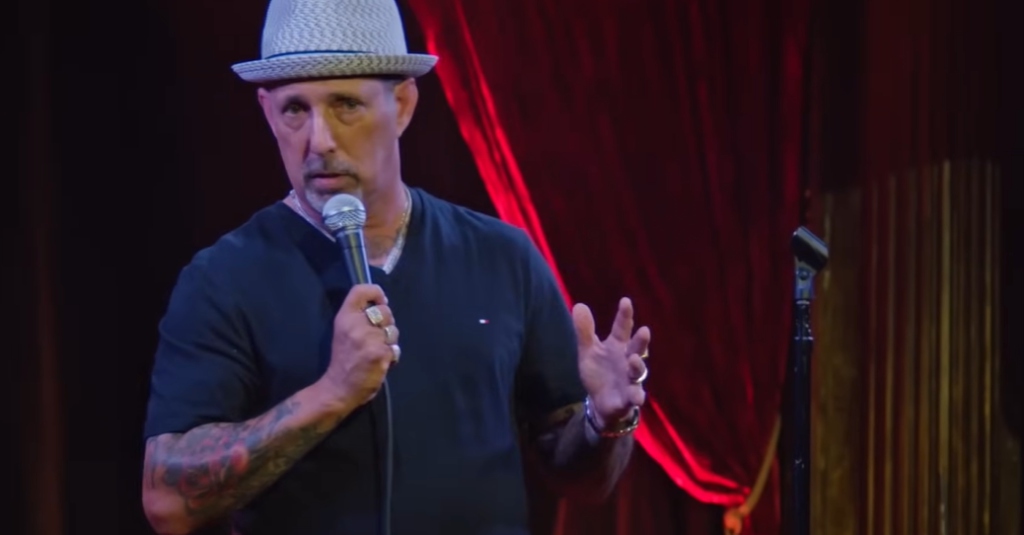Rich Vos has been practicing self-deprecating humor for more than 40 years, and he frequently uses his shortcomings as a weapon before others do. One person, however, has been calling him out with pinpoint accuracy for almost 20 years in addition to matching him joke for joke. With a style that is remarkably dry, unquestionably intelligent, and full of edge from real life, his wife, Bonnie McFarlane, has subtly transformed contemporary comedy partnerships. Their marriage is a living, breathing partnership that continuously turns ordinary conflict into incredibly relatable comedy; it is not merely a passing reference in his act.
The podcast, My Wife Hates Me, has been a creative outlet and an unvarnished window into the couple’s life together since 2011. Their show thrives on conflict, candor, and comic timing, in contrast to many overly produced shows that are built on chemistry by design. Because everyone is laughing through the trauma, each episode feels less like a performance and more like watching a therapy session.
Bonnie McFarlane – Bio & Career Table
| Category | Details |
|---|---|
| Full Name | Bonnie McFarlane |
| Date of Birth | March 28, 1969 |
| Age | 56 (as of 2025) |
| Birthplace | Cold Lake, Alberta, Canada |
| Nationality | Canadian |
| Marital Status | Married to Rich Vos (since 2005) |
| Children | Rayna Lynn Vos |
| Profession | Comedian, Writer, Podcaster |
| Known For | My Wife Hates Me, Last Comic Standing |
| Notable Book | You’re Better Than Me (2016 Memoir) |
| Notable Film | Women Aren’t Funny (2014 Documentary) |
| Reference | Wikipedia |
Bonnie’s history reads less like a resume and more like a character arc. She came to the United States with ambition, a sharp voice, and a dislike of clichés after growing up in rural Alberta and being influenced by the unvarnished nature of early Canadian stand-up. She got a spot on Last Comic Standing because of her viewpoint—feminist without slogans, edgy without cruelty—but her work since that show has significantly increased her influence in the comedy industry. Her autobiography, You’re Better Than Me, continues to be a strikingly powerful analysis of ambition, insecurity, and surviving in a field that is based on rejection.

McFarlane helped reimagine what a comedic collaboration could entail by working closely with Vos. She challenges him—vocally, intellectually, and unapologetically—instead of standing next to him in silence or saying the occasional “yes, dear” on stage. There is no staged push-pull between them. It’s a deeply felt experience. Instead of alienating their audience, that tension has turned into the focal point of their performance.
Their live performances attract an audience eager for that unique experience—authenticity without filters—for medium-sized comedy venues. Perfect marital moments are not what they are trading in. They’re breaking down actual disputes, misunderstandings, and years of conflicting priorities, then using those instances as fodder for jokes. Additionally, Vos and McFarlane’s comedy is sharp, occasionally awkward, and frequently incredibly relatable, in contrast to influencer couples whose carefully manicured lives feel suspiciously smooth.
With unexpected depth, Bonnie has also ventured into film and literature in the last ten years. Her documentary Women Aren’t Funny focuses more on analyzing the faulty system that initially made the question pertinent than it does on disproving the title. Her interviews exposed the flaws in the logic of the industry, interspersed with incisive commentary and quiet moments of absurdity. It was especially creative in the way it broke the fourth wall, laughing through prejudices in addition to exposing them.
Her writing and commentary have become even more grounded in recent years. She doesn’t depend on virality or trends. She simplifies her content into punchlines that seem earned by drawing on personal experience instead. Her parenting jokes sting with uncomfortable realities rather than rehashing sitcom clichés. Her thoughts on gender are derived from hundreds of nights on the road, writers’ rooms, and dressing rooms; they are not theoretical.
Rich Vos frequently makes fun of his shortcomings, such as his speech, his education, and his addictions, but he is remarkably honest when acknowledging Bonnie’s influence. He frequently gives her credit for fostering his professional and personal development in interviews and performances. Their partnership has evolved into more than just content thanks to strategic tension and mutual vulnerability; it’s a masterwork of comedic resilience.
Their adolescent daughter, Rayna, is rarely featured in public content but is occasionally mentioned on the podcast. Their public-facing chaos gains a layer of integrity from this boundary, which they both fiercely defend. Even though they have made a lot of their lives into jokes, they have preserved what really matters by refusing to use family as a means of getting attention or clicks.
Bonnie has established themselves as a model for other female comedians thanks to their consistent output. Not by yelling over men, but by coolly and precisely dismantling old presumptions. Although media attention is frequently dominated by celebrities like Ali Wong, Nikki Glaser, and Hannah Gadsby, McFarlane’s more subdued but no less influential voice continues to influence the industry from within. She is creating a legacy, one joke at a time, rather than pursuing fame.

